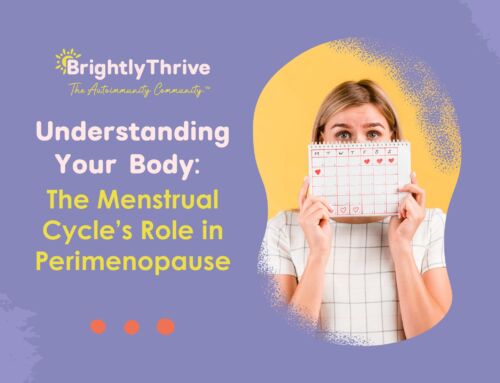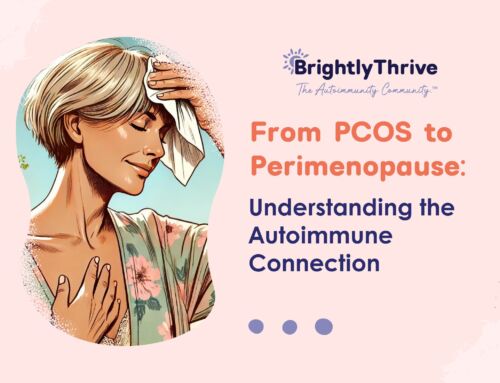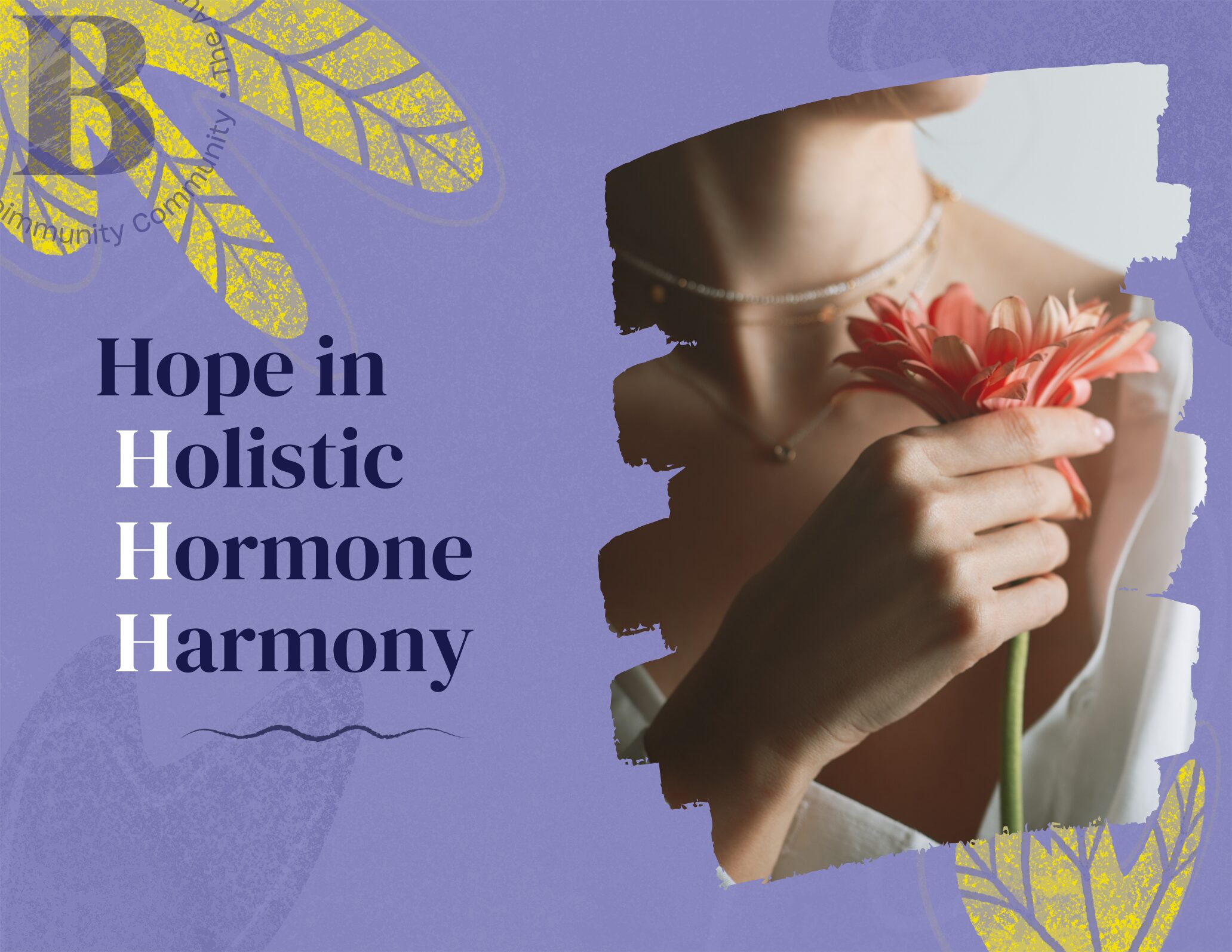
Hope in Holistic Hormone Harmony
If you’re a millennial, like most of us, you’ve probably heard about Triple H.
Yup, the big muscly guy flying all over wrestling rings, serving Pedigrees (his finisher move) like it’s Thanksgiving dinner.
But now that our generation is mostly in our early to mid-adulthood, there’s another ‘H’ that’s become all too familiar for many of us, but maybe not for the best reasons, especially among women with autoimmunity across ages—hormones.
In this blog, we will focus on hormone health, giving a fresh spin to the Triple H brand that many men have followed for years. This time, however, our emphasis is on women and the goal of achieving Holistic Hormone Health.
Let’s dive into some of the ways we can create hormonal balance by approaching our health holistically.
Hormone Hijack
You know that feeling when you’re sure you left your keys on the table, but they vanish into thin air? Hormonal imbalances are like that—sneaky, disruptive, and making you question your sanity.
One minute, everything seems fine, and the next, you’re in a whirlwind of confusion, searching for balance.
Imagine being a detective, Sherlock Holmes style, minus the trench coat and pipe, but armed with a magnifying glass.
We’re on a mission to trace where these imbalances happen, uncover their causes, and understand their potential effects and address them holistically.
The Causes of Hormonal Imbalance
- Stress
Chronic stress is like a master puppeteer, pulling the strings of your hormone production.
When you’re constantly stressed, your body produces cortisol, the stress hormone, in overdrive.
This not only affects cortisol levels but also throws off the balance of other hormones like estrogen, progesterone, and testosterone.
- Diet
Eating too much sugar, refined carbs, and processed foods can spike insulin levels and lead to insulin resistance, which in turn affects sex hormones.
Lack of essential nutrients can also impair hormone production and regulation.
- Sleep
Poor sleep quality or not getting enough sleep disrupts the production of hormones like growth hormone and melatonin, affecting overall hormonal balance.
- Environmental toxins
Chemicals in plastics, personal care products, and even household cleaners can mimic hormones and interfere with your endocrine system.
- Medical conditions
Conditions like polycystic ovary syndrome (PCOS), thyroid disorders, and autoimmune diseases can directly impact hormone production and balance.
How the Imbalance Happens
Hormonal imbalance can happen when your body’s finely tuned orchestra of hormones hits a wrong note.
For instance, when you’re stressed, your adrenal glands release more cortisol.
High cortisol levels can lead to lower production of reproductive hormones, throwing your menstrual cycle out of whack.
A diet high in sugar causes your pancreas to pump out more insulin.
Too much insulin can lead to insulin resistance, where your cells don’t respond well to insulin, affecting the balance of sex hormones like estrogen and testosterone.
Lack of sleep messes with your body’s internal clock, the circadian rhythm, disrupting the release of growth hormone and melatonin.
Environmental toxins, like BPA in plastics, mimic estrogen in your body, confusing your endocrine system and leading to an overload of certain hormones.
Medical conditions like PCOS cause an overproduction of androgens, male hormones, which can lead to symptoms like irregular periods and acne.
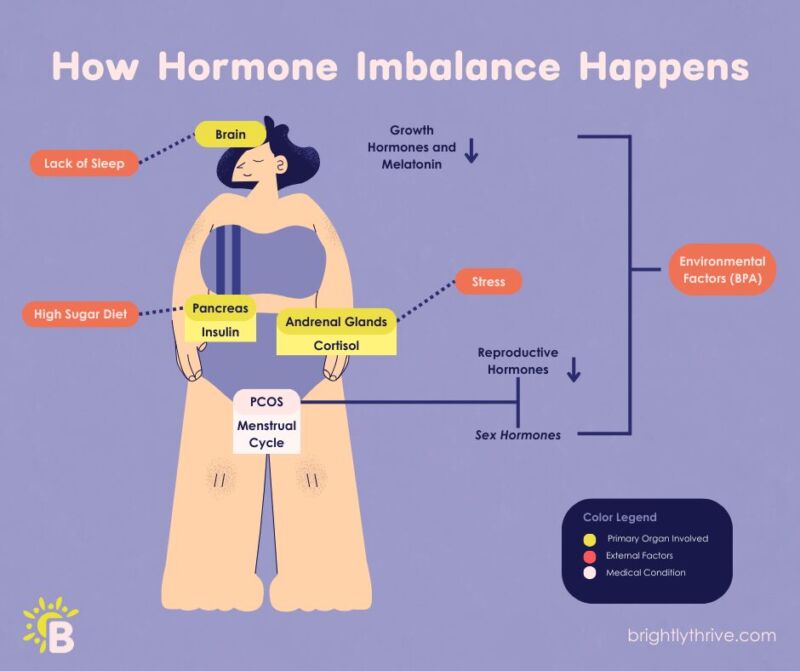
Potential Effects of Hormonal Imbalance
- First up, the elusive libido. Yes, that’s a thing!
An imbalance can send your libido on an unplanned vacation, leaving you wondering where the spark went. You can read more about it here.
- Next, let’s talk mood.
Hormonal imbalances can turn you into an emotional yo-yo, swinging from happy to sad to angry faster than you can say “hormonal roller coaster.”
- Energy levels are another casualty.
One moment you’re bouncing off the walls, and the next, you’re dragging yourself through the day, longing for a nap that never seems to come.
- Sleep? Forget about it.
Poor sleep can trigger a vicious cycle, promoting stress, low energy levels, and hormone imbalance.
Hormonal imbalances can make you toss and turn, robbing you of those precious Zzz’s and leaving you feeling like a zombie.
As stress levels rise and energy plummets, it becomes even harder to get a good night’s sleep, further disrupting your hormones and overall well-being.
It’s a cycle that can be tough to break, but understanding the connection is the first step toward finding a solution.
- And let’s not forget the skin.
Your face might decide to relive its teenage years with unexpected breakouts, or it might become dry and dull, like it’s going through a midlife crisis.
But fear not!
By understanding where these imbalances happen and what causes them, we can start addressing them and work towards harmony.
Think of it as our detective work paying off, leading us to clues that help solve the mystery of hormonal health.
Wrestling with Hormonal Imbalances
Picture this: your hormones are having a full-on WWE match inside you.
Imbalance can feel like domination and overwhelm, making you feel like a ragdoll in the ring.
On the flip side, you might experience submission and lack, leaving you feeling drained and powerless.
But don’t throw in the towel just yet!
There is a peaceful, natural approach to this seemingly relentless wrestlemania: holistic healing.
5 Tips for Achieving Balance Through Holistic Healing
Here are some practical ways to bring balance to your hormonal rumble:
1. Mindful Nutrition
Eat like your grandma taught you: whole foods, plenty of greens, and don’t forget water.
Your body needs the right fuel to keep those hormones in check.
2. Regular Exercise
Move it or lose it!
Regular exercise boosts endorphins, reduces stress hormones, improves sleep, enhances insulin sensitivity, stimulates growth hormones, and boosts metabolism, leading to balanced hormones and overall well-being.
3. Stress Management
Incorporate relaxation techniques like yoga, meditation, or even just a good laugh with friends within your daily routine.
With our ThriveGuides™ showing up daily in our community, you can just simply tune in and get a dose of these helpful practices to calm your body regularly!
4. Sleep Well
Treat sleep like the VIP guest it is.
We cannot further emphasize the importance of a good night’s rest.
There is a plethora of scientific research pointing to the critical role sleep plays in our physical and mental well-being. One of the most astounding pieces of research on sleep highlights its impact on cognitive function, emotional stability, and overall longevity.
Aim for 7-9 hours of quality sleep to give your body the rest it needs to balance hormones, reduce stress, and boost your energy levels.
Prioritizing sleep can transform your overall health, making you feel rejuvenated and ready to tackle whatever comes your way.
Make your bedroom a sleep sanctuary and establish a bedtime routine that soothes your mind and body, ensuring you get the restorative sleep you deserve.
5. Natural Supplements
Consider natural supplements like omega-3s, magnesium, and adaptogens after consulting with a healthcare professional.
There is Hope!
Find hope in a community where women support women at BrightlyThrive™.
Empower yourself with the knowledge that you can start adopting holistic health practices today.
Think of it as going back to basics coupled with stronger intuition towards your well-being.
Support abounds in our community—join BrightlyThrive!
Your journey to holistic hormone harmony starts now, and you don’t have to go it alone.
So, pull on those workout leggings, lace up those boots, and step into the ring with us.
Together, we’ll tackle this journey to holistic hormone harmony!
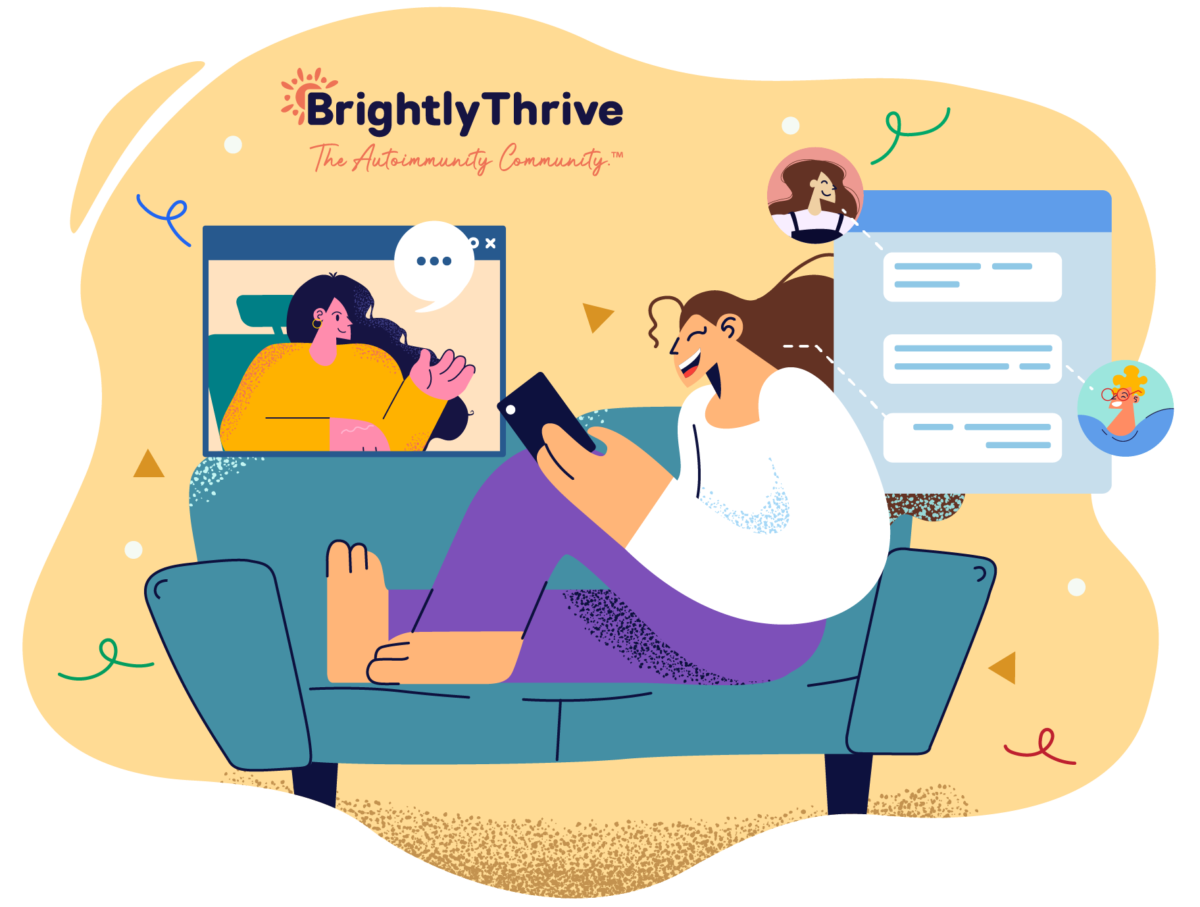
References
Tee-Melegrito, R. A. (2023b, May 5). Cortisol and stress: What is the connection? https://www.medicalnewstoday.com/articles/cortisol-and-stress
Maguire, B. (2019, December 18). HIGH STRESS LEVELS AND CORTISOL – pH Focused. pH Focused. https://www.phfocused.com/ph-balance/high-stress-levels-and-cortisol/
Arora, S. (2023, April 11). Is sugar sabotaging your hormones? Women’s Health Network. https://www.womenshealthnetwork.com/hormonal-imbalance/hormonal-imbalance-caused-by-sugar/
Kim, T. W., Jeong, J. H., & Hong, S. C. (2015). The Impact of Sleep and Circadian Disturbance on Hormones and Metabolism. International Journal of Endocrinology, 2015, 1–9. https://doi.org/10.1155/2015/591729
Bryce, E. (2024, March 13). How Do Chemicals in Plastics Impact Your Endocrine System? Scientific American. https://www.scientificamerican.com/article/how-do-chemicals-in-plastics-impact-your-endocrine-system/
Palomba, S., Colombo, C., Busnelli, A., Caserta, D., & Vitale, G. (2023). Polycystic ovary syndrome and thyroid disorder: a comprehensive narrative review of the literature. Frontiers in Endocrinology, 14. https://doi.org/10.3389/fendo.2023.1251866
Rdn, V. W., & Russin, H. (2024, March 11). What Is Mindful Eating, and How Do You Practice It? Signos. https://www.signos.com/blog/what-is-mindful-eating
Ramar, K., Malhotra, R. K., Carden, K. A., Martin, J. L., Abbasi-Feinberg, F., Aurora, R. N., Kapur, V. K., Olson, E. J., Rosen, C. L., Rowley, J. A., Shelgikar, A. V., & Trotti, L. M. (2021). Sleep is essential to health: an American Academy of Sleep Medicine position statement. Journal of Clinical Sleep Medicine, 17(10), 2115–2119. https://doi.org/10.5664/jcsm.9476
Mayer, B. A. (2022, December 23). Try it or Toss it? The Supplements You Need and the Ones You Can Skip. Healthline. https://www.healthline.com/nutrition/try-it-or-toss-it-the-supplements-you-need-and-the-ones-you-can-skip
TAGS:
CATEGORIES:



